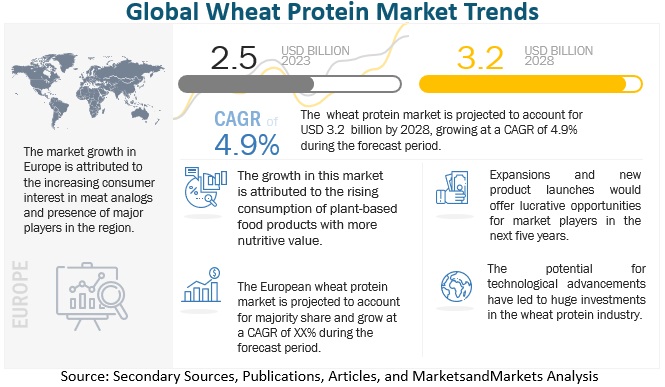The global wheat protein market is expected to expand from $2.5 billion in 2023 to $3.2 billion by 2028, reflecting a compound annual growth rate (CAGR) of 4.9% during this period. This growth is driven by the rising popularity of meat-free diets, increasing rates of obesity that are fueling the demand for low-calorie food options, and consumers’ preference for healthier food choices. Wheat gluten, known for its high protein content, has become an appealing option, thereby enhancing its demand in the global market.

The Wheat Protein Market centers around proteins extracted from wheat, commonly utilized in various food and non-food applications due to their functional properties. Key proteins include glutenin and gliadin, which contribute to the elasticity and extensibility essential for baking and other culinary uses. Wheat proteins come in various types, such as wheat gluten, wheat protein isolate, hydrolyzed wheat protein, and textured wheat protein, each catering to different industries.
Market Drivers:
Increasing Demand for Plant-Based Proteins: With the rise in vegetarian and vegan lifestyles, wheat protein is seen as an attractive alternative to animal-based proteins.
Health and Wellness Trends: Consumers are looking for high-protein, low-fat ingredients, positioning wheat protein as a desirable product in the health food sector.
Growing Bakery and Confectionery Industry: Wheat proteins are vital for achieving the right texture in baked goods and other processed foods.
Applications:
Food & Beverages: Used extensively in bread, pasta, snack foods, and meat substitutes.
Cosmetics and Personal Care: Hydrolyzed wheat proteins are incorporated into shampoos, conditioners, and skincare products for their moisturizing and conditioning benefits.
Animal Feed: Wheat protein is also added to pet foods and livestock feed for its nutritional benefits.
Challenges:
Gluten Sensitivity and Celiac Disease: The presence of gluten in wheat protein can be a drawback for consumers with gluten intolerance, limiting its appeal.
Competition from Other Plant Proteins: Alternatives such as pea protein and soy protein may offer a challenge due to their different nutritional profiles and non-gluten status.
Here are some current trends in the Wheat Protein Market:
Increasing Demand for Plant-Based Proteins: With the growth in vegan and vegetarian diets, wheat protein has become an attractive alternative to animal proteins. Its functional properties make it suitable for various plant-based meat substitutes and dairy-free products.
Rising Use in Nutraceuticals: Wheat proteins are increasingly being incorporated into health and wellness products due to their high protein content and beneficial amino acid profile.
Technological Advancements: Improved extraction and processing techniques have enhanced the quality and functionality of wheat proteins, making them more appealing to manufacturers in the food and beverage industry.
Focus on Sustainable Ingredients: Consumers are becoming more environmentally conscious, prompting companies to emphasize sustainability. Wheat protein, being plant-based, fits well into this trend as a more eco-friendly protein source compared to animal-derived proteins.
Expansion in Sports Nutrition: Wheat protein is gaining popularity as an ingredient in sports and fitness supplements due to its muscle recovery and performance benefits, offering an alternative to traditional whey and soy proteins.
Functional Foods and Bakery Applications: Wheat protein’s binding and elasticity properties make it essential in baked goods, snacks, and other processed foods, driving growth in the market.
Regional Growth: The market for wheat protein is witnessing significant growth in regions like North America and Europe due to increasing health awareness and the trend of high-protein diets.
Europe Set to Lead the Market Throughout the Forecast Period.
Wheat protein consumption in Europe is higher than in any other region. As consumers increasingly turn to plant-based proteins, like wheat protein, due to the rising costs of animal-based alternatives, the market for affordable plant-derived proteins, including wheat and vegetable proteins, has expanded as substitutes for animal protein.
Germany stands out as a key market for manufacturers and exporters. Bread plays a vital role in the German diet, making it a significant segment of the baked goods industry. The country’s well-established bakery and snacks sector boasts a substantial consumer base with considerable purchasing power. Health-conscious consumers are seeking nutritious baked goods that do not sacrifice flavor, prompting major players in the bakery industry to innovate and promote new products to cater to this demand. In Germany, barley and wheat are the primary ingredients used for feed products.
The key players in this market include ADM (US), Cargill, Incorporated (US), Tereos (France), Südzucker AG (US), MGP Ingredients (US), Roquette Frères (France), Glico Nutrition Foods Co., Ltd. (Japan), Kerry Group PLC (Ireland), Manildra Group (Australia), Kröner-Stärke (Germany), Crespel & Deiters Group (Germany), Batory Foods (US), Agridient B.V. (Netherlands), Tate & Lyle (UK), and The Scoular Company (US).
ADM is a prominent global leader in the nutrition industry, operating through four main segments: Ag services and oilseeds, carbohydrate solutions, nutrition, and more. Within its nutrition division, ADM provides plant protein products like wheat protein, used in food applications such as bakery items, snacks, confectionery, and cooking. The company sources plant-based proteins from ingredients like pea, soy, and wheat, which are widely utilized in dairy alternatives, meat substitutes, and feed products. ADM’s operations span North America, South America, Europe, Asia, Australia, and Africa.
Cargill, Incorporated is a multinational conglomerate that serves various industries. The company is structured into 75 business units categorized into four main segments: agriculture, food, financial services, and industrial products. Under its food segment, Cargill supplies plant proteins, including wheat protein products, to meet the demand for food ingredients. With operations in approximately 70 countries and a sales presence in nearly 125 countries, Cargill has a broad global footprint. In July 2019, the company invested USD 200 million to diversify its starches and sweeteners portfolio, adding wheat-based ingredients such as wheat protein. This investment at its Krefeld, Germany facility enabled Cargill to expand its product offerings to include specialty starches and wheat proteins.
In November 2022, Crespel & Deiters Group introduced its new textured wheat protein in the market. This launch expanded its textured vegetable protein line.
In April 2022, ADM invested USD 300 million to expand its alternative plant-protein production capacity in Illinois to meet the growing demand for plant-based ingredients.
In February 2022, MGP Ingredients announced its plant for the construction of a new manufacturing facility for the production of textured protein. This expansion is aimed at meeting the growing demand for plant-based meat.
In April 2020, MGP Ingredients expanded its line of textured protein to cater to meat analogs. This expansion further enhanced its product portfolio.
Key Questions Addressed by the Wheat Protein Market Report:
What is the projected market value of the global wheat protein market?
What is the estimated growth rate (CAGR) of the global wheat protein market for the next five years?
What are the major revenue pockets in the wheat protein market currently?
What are the nutritional benefits of wheat protein?
What are the factors driving the growth of the wheat protein market?
What are the major players operating in the wheat protein market?
About MarketsandMarkets™
MarketsandMarketsTM has been recognized as one of America’s best management consulting firms by Forbes, as per their recent report.
MarketsandMarkets™ is a blue ocean alternative in growth consulting and program management, leveraging a man-machine offering to drive supernormal growth for progressive organizations in the B2B space. We have the widest lens on emerging technologies, making us proficient in co-creating supernormal growth for clients.
Earlier this year, we made a formal transformation into one of America’s best management consulting firms as per a survey conducted by Forbes.
The B2B economy is witnessing the emergence of $25 trillion of new revenue streams that are substituting existing revenue streams in this decade alone. We work with clients on growth programs, helping them monetize this $25 trillion opportunity through our service lines – TAM Expansion, Go-to-Market (GTM) Strategy to Execution, Market Share Gain, Account Enablement, and Thought Leadership Marketing.
Built on the ‘GIVE Growth’ principle, we work with several Forbes Global 2000 B2B companies – helping them stay relevant in a disruptive ecosystem. Our insights and strategies are molded by our industry experts, cutting-edge AI-powered Market Intelligence Cloud, and years of research. The KnowledgeStore™ (our Market Intelligence Cloud) integrates our research, facilitates an analysis of interconnections through a set of applications, helping clients look at the entire ecosystem and understand the revenue shifts happening in their industry.
Media Contact
Company Name: MarketsandMarkets™ Research Private Ltd.
Contact Person: Mr. Rohan Salgarkar
Email: Send Email
Phone: 18886006441
Address:1615 South Congress Ave. Suite 103
City: Delray Beach
State: FL 33445
Country: United States
Website: https://www.marketsandmarkets.com/Market-Reports/wheat-protein-market-67845768.html

